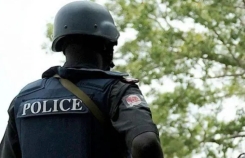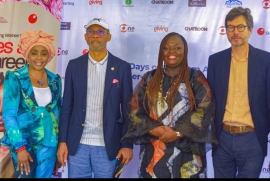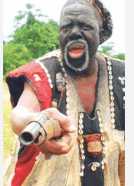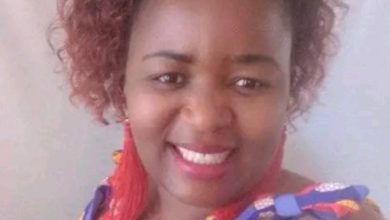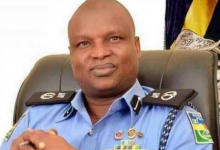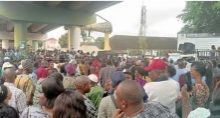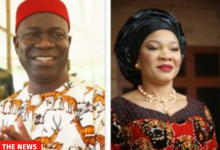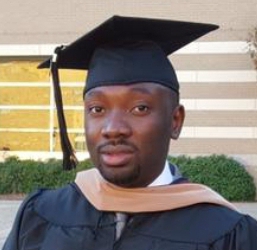
Investigation: How FBI , U.S Prosecutors Convict Nigerian on Frame-up Charges ((1)
By Abdallah el-Kurebe
OLUFOLAJIMI Abegunde is a Nigerian who went to the U.S in 2014 for a Master of Business Administration (MBA) degree at Texas A & M University in college station and graduated in 2016. He thereafter incorporated FJ Williams Inc. and operate (DBA) TranzAlert, a financial technology start-up, which was licensed and registered with the financial Crimes Enforcement Network (FINCEN), U.S. Department of the Treasury, the Georgia Department of Banking and Finance, and the Central Bank of Nigeria. He was licensed to engage in the currency exchange and international remittance business. Click here to view regulatory licenses associated with Abegunde’s business, FJ Williams Inc. DBA TranzAlert.
While innocent black people are wrongfully accused, convicted of crimes they did not commit; the disparities in punishment for the whites and that for racial minorities on similar offences have recently been acknowledged by a U.S judge. Judge John T. Fowlkes Jr, United State District Judge for the Western District of Tennessee — the same district where Abegunde was indicted and prosecuted — had raised concerns that prosecutors in the Western District of Tennessee bring harsher charges against black defendants than white defendants for similar crimes. Judge Fowlkes also raised concerns about racial discrimination — by prosecutors in the Western District of Tennessee — in at least three different cases. ABCNews and Commercial Appeal
In this investigation, Olufolajimi Abegunde was indicted and charged with Wire Fraud Conspiracy, Money Laundering Conspiracy and Aggravated Identity Theft offences before the Western District Court of Tennessee. His story of indictment, prosecution, and conviction in the U.S, is yet another without evidence of wrongdoing — as far as the trial transcripts obtained, have shown.
SIGN THIS PETITION TO DEMAND JUSTICE FOR ABEGUNDE !!!
The beginning of Abegunde’s travails
Abegunde’s travails began in August, 2016 when his long-time friend Ayodeji Ojo visited the U.S. from Nigeria visited the U.S and were accommodated by Abegunde at his home in Atlanta, Georgia. Ojo had a Bank of America check of $29,900 for his family’s medical expenses, which he couldn’t cash over the bank’s counter. On advice by the bank’s staff, on August 29, 2016, he opened an account with a different Wells Fargo Bank, which requirement included the provision of valid identification document, a U.S. mailing address and a U.S. mobile phone number. He was allowed to us Abegunde’s as mailing address and phone number for correspondences purposes. According to Ojo, “I informed the Wells Fargo banker that I was a visitor in the U.S. and did not have a U.S. mailing address and a U.S. mobile phone number. After asking, the banker accepted that I could use Abegunde’s address and mobile phone number to open the account.” He accessed his funds two days after without any challenges. Also, in the first week of October 2016, Ojo had exchanged the Nigerian Naira equivalent of $9,000 through an informal vendor, Leke Adenuga who deposited the said sum into Ojo’s Wells Fargo bank.
Ojo had returned to Lagos, Nigeria through Amsterdam, Netherlands on September 16, 2016 flying with Air France flight No KL0587 Resa, operated by KLM Royal Duch Airlines. While back in Nigeria, on October 11, 2016, an investigator with Wells Fargo bank, Brian Ancona called Abegunde on the mobile phone number Ojo had used to open Ojo’s Wells Fargo bank account. Ancona said a certain Luis Ramos Alonso had inadvertently deposited $9,000 into Ojo’s bank account, and was seeking its reversal. Abegunde called Ojo and at trial, Brian Ancona confirmed that his phone call resulted in the reversal of the $9,000 that was deposited into Ojo’s Bank account. See Document 353: Brian Ancona testimony, March 12, 2019, Page ID 3029 here, Document 353: Brian Ancona testimony, March 12, 2019, Page ID 3030 here and Document 353: Brian Ancona testimony, March 12, 2019, Page ID 3032) here.
FBI agents’ visit to Abegunde
However, in the early morning of March 15, 2017, two FBI agents, Kevin Hall and Tyson Fowler of the Atlanta Field Division of the FBI, visited Abegunde’s home to inquire about Ojo. They also discussed Abegunde’s allowance of Ojo to use his address and mobile phone number to open the Wells Fargo Bank account as well as Abegunde’s remittances business and fraud in general. Court records confirm that, Abegunde gave the agents his full cooperation by providing them Ojo’s contact information.
SIGN THIS PETITION TO DEMAND JUSTICE FOR ABEGUNDE !!!
According to Ojo, he communicated with the FBI agents, including Leke Adenuga’s contact information in an email through Kevin.hall@ic.fbi.gov on Thursday, March 16, 2017 in which he sent details of Leke Adenuga with contact mobile number ending +2348******677. Adenuga facilitated the exchange of the Naira equivalent of $9,000 deposited into Ojo’s Wells Fargo bank account. Trial documents confirm that FBI agent Kevin Hall corroborated that Ojo contacted them. See Document 353: Kevin Hall testimony, March 12, 2019, Page ID 3195-3196 here. He also confirmed that there was no prior existing relationship with Luis Ramos Alonso, who transferred the $9,000 into his account.
Similarly, the FBI case agent, Marcus Vance testified during trial that Alonso neither knew Abegunde nor Ojo See document 353: Special Agent Marcus Vance testimony, March 12, 2019, Page ID 3139 here. Alonso also confirmed he never knew Abegunde or Ojo. From record of trial proceedings, no evidence was presented to connect Abegunde and Ojo with the charges against them. Alonso’s attorney asked Alonso “Did you even know that he existed before that?” Alonso said “No.” See document 334: Javier Ramos Alonso testimony, March 18, 2019, Page ID 2500-2501 here.
History of few cases involving blacks in the U.S
The US justice system is perceived fair and just. However, the following examples tell a different story:
- Court exonerates black man, Kevin Strickland after 42 years in prison: The National Registry of Exonerations’ data logged since 1989 reveals this as the 17th longest and wrongful sentence in the U.S. history. BBCNews
- Court dismisses case against four black men after 72 years in prison: “We followed the evidence to see where it led us, and it led us to this moment,” Gladson said at a news conference following the judge’s decision. NBCNews
- Manhattan District Court to exonerate alleged killers of Malcom X after 55 years in prison: They found that prosecutors and two of the nation’s premier law enforcement agencies — the Federal Bureau of Investigation and the New York Police Department — had withheld key evidence that, had it been turned over, would likely have led to the men’s acquittal. NYTimes
- Jury awards man who has spent 26 years in prison $6m after finding police fabricated evidence: Salem found former Durham police detective Darryl Dowdy fabricated evidence in the case and trial that resulted in Howard’s conviction in 1995 of killing a woman and her daughter in 1991. The Durham County judge vacated Howard’s convictions citing police and prosecutorial misconduct. USNews.
The common thread in these examples is that the evidence against the victims was generally insufficient to convict them. In other words, there is a perpetual scapegoating of innocent people, especially the blacks in the U.S. justice system. Acording to the National Registry of Exonerations, since 1989, nearly 3,000 people that were wrongfully convicted have been exonerated. “About half of them are black, 35% White and 12% Hispanic.”
SIGN THIS PETITION TO DEMAND JUSTICE FOR ABEGUNDE !!!
Visit here for more information

